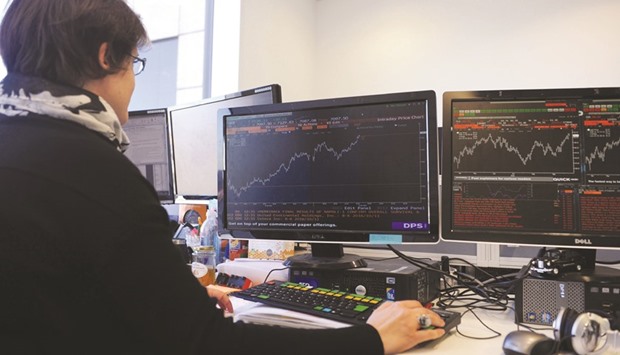Europe’s stock markets took a break from Trump-watching yesterday as US markets were closed, instead mulling developments on their own continent.
Optimism about a bailout deal for Greece was tempered by signs of growing anti-EU sentiment in France ahead of the presidential election in April and May, analysts said.
Polls suggest that National Front candidate Marine Le Pen is gaining on her main rivals, making any second-round runoff in May a closer call, although she would still lose.
“Political developments in France and Greece and the absence of US investors, who were busy celebrating Presidents Day, meant European stocks showed no clear direction,” said Jasper Lawler, an analyst at London Capital Group.
“Europe is caught between the good news of a likely Greek bailout deal and the bad news of rising anti-EU sentiment in France before its election,” he said.
“Markets remain nervous about the presidential election in France,” agreed analysts at brokers Aurel BGC in Paris, saying this is why European mostly gave up early gains over the day.
Eurozone ministers sought yesterday to break a deadlock with the IMF on Greece’s bailout, with Germany saying they had now reached a “common position” and EU sources saying that Greece had agreed to a compromise on reforms.
The CAC-40 index in Paris closed 0.1% lower at 4,864.99.
Among French stocks, PSA fell after a German newspaper report said the French automaker has pledged to keep Opel plants in Germany running if a planned merger goes forward, and to refrain from layoffs until at least 2019.
Frankfurt posted modest closing gains of 0.6% at 11,827.62 after the Bundesbank predicted a pickup in growth for the first quarter, fuelled by industrial activity and consumer spending.
In London, where the FTSE 100 closed little changed at 7,299.86 points, Unilever stock shed 7% after Kraft Heinz backed off from pursuing a merger with the British-Dutch giant.
At the weekend, US food giant Kraft Heinz dropped a bid to buy Unilever just days after the Dutch-British consumer goods group rejected a $143bn buyout offer.
Dealers said once Unilever had rejected Kraft’s friendly approach the US company’s only option was to go hostile, which it did not want to do.
They noted, however, that Monday’s share price decline was still far from wiping out Friday’s 13.7% gain, which suggests that a more modest deal between the two companies may still be on the cards. They would also not rule out Kraft making a new approach further down the road.
Meanwhile Kraft may turn towards other potential targets to expand, analyst said.
“Although the Kraft Heinz deal for Unilever met a very quick end, the market has been quick to embrace the wider possibility of future potential mergers and acquisitions,” said Rebecca O’Keeffe, head of investment at stockbroker Interactive Investor.
Offsetting yesterday’s losses for Unilever was a jump in Royal bank of Scotland’s share price.

A trader works at the London Stock Exchange. The FTSE 100 closed little changed at 7,299.86 points yesterday.
